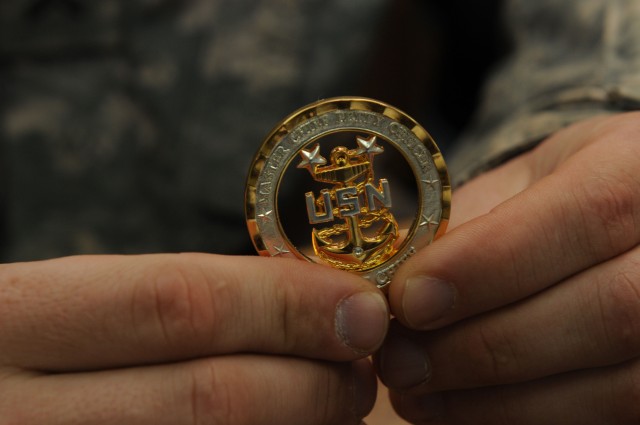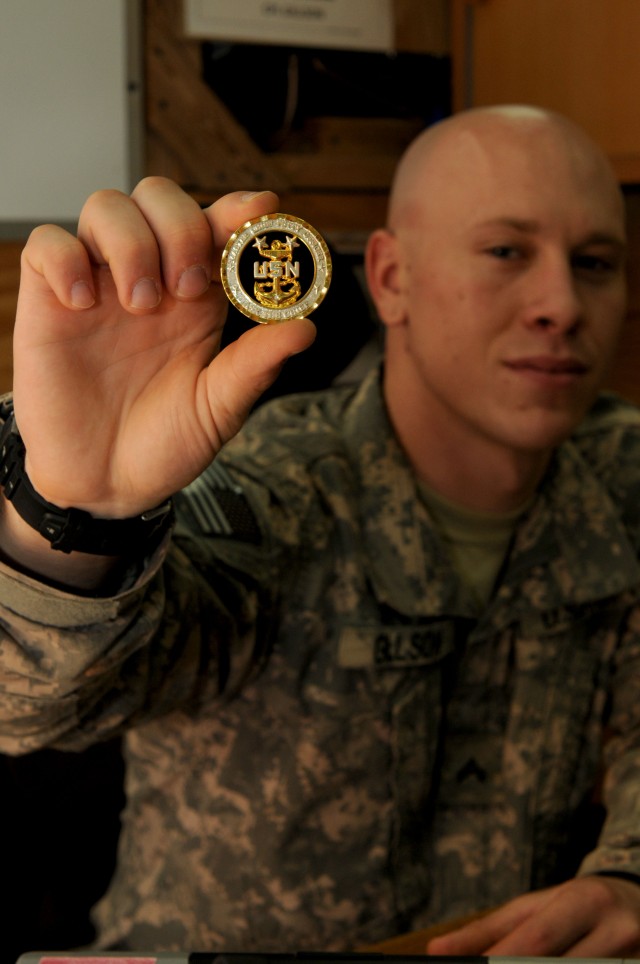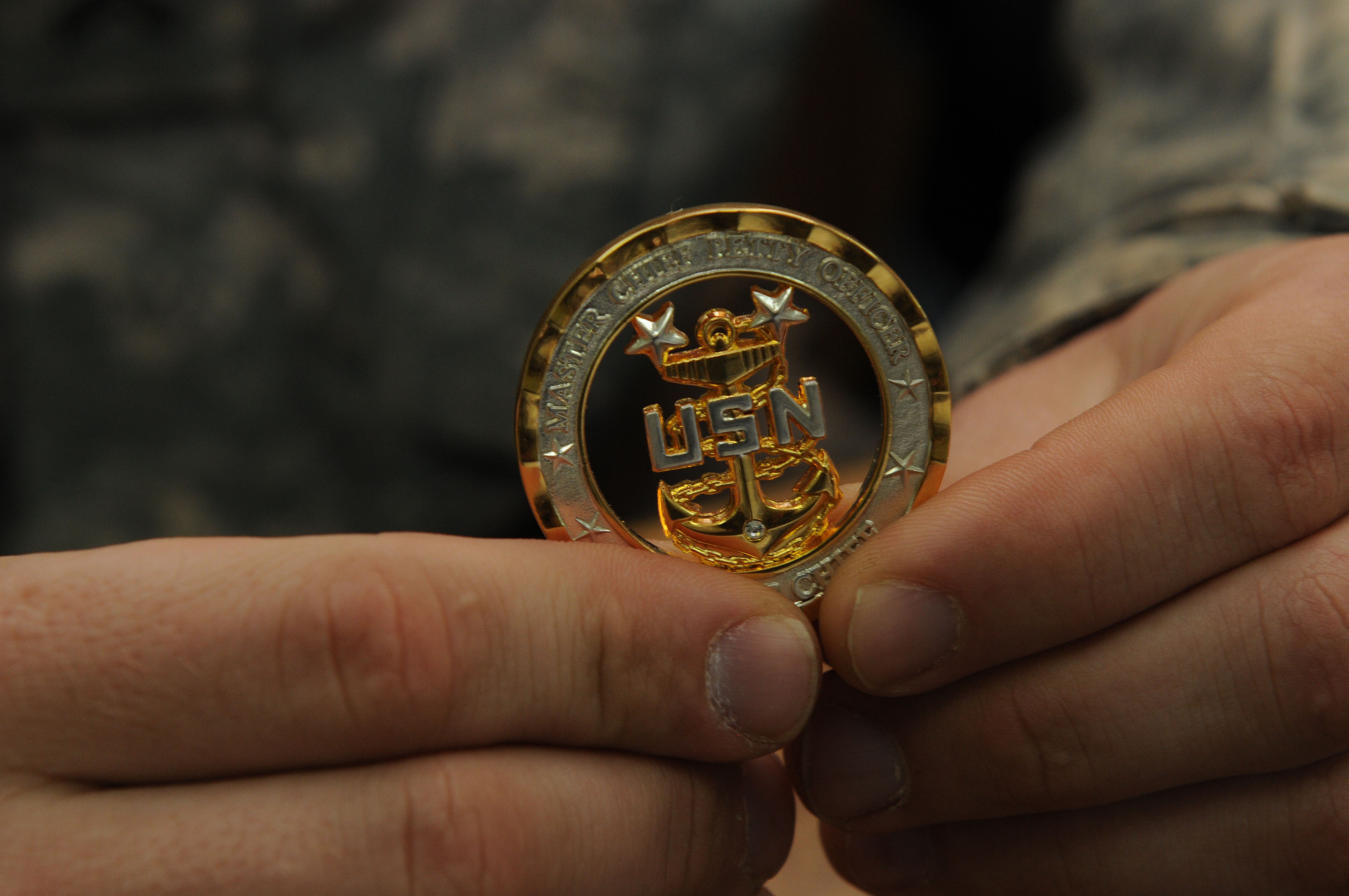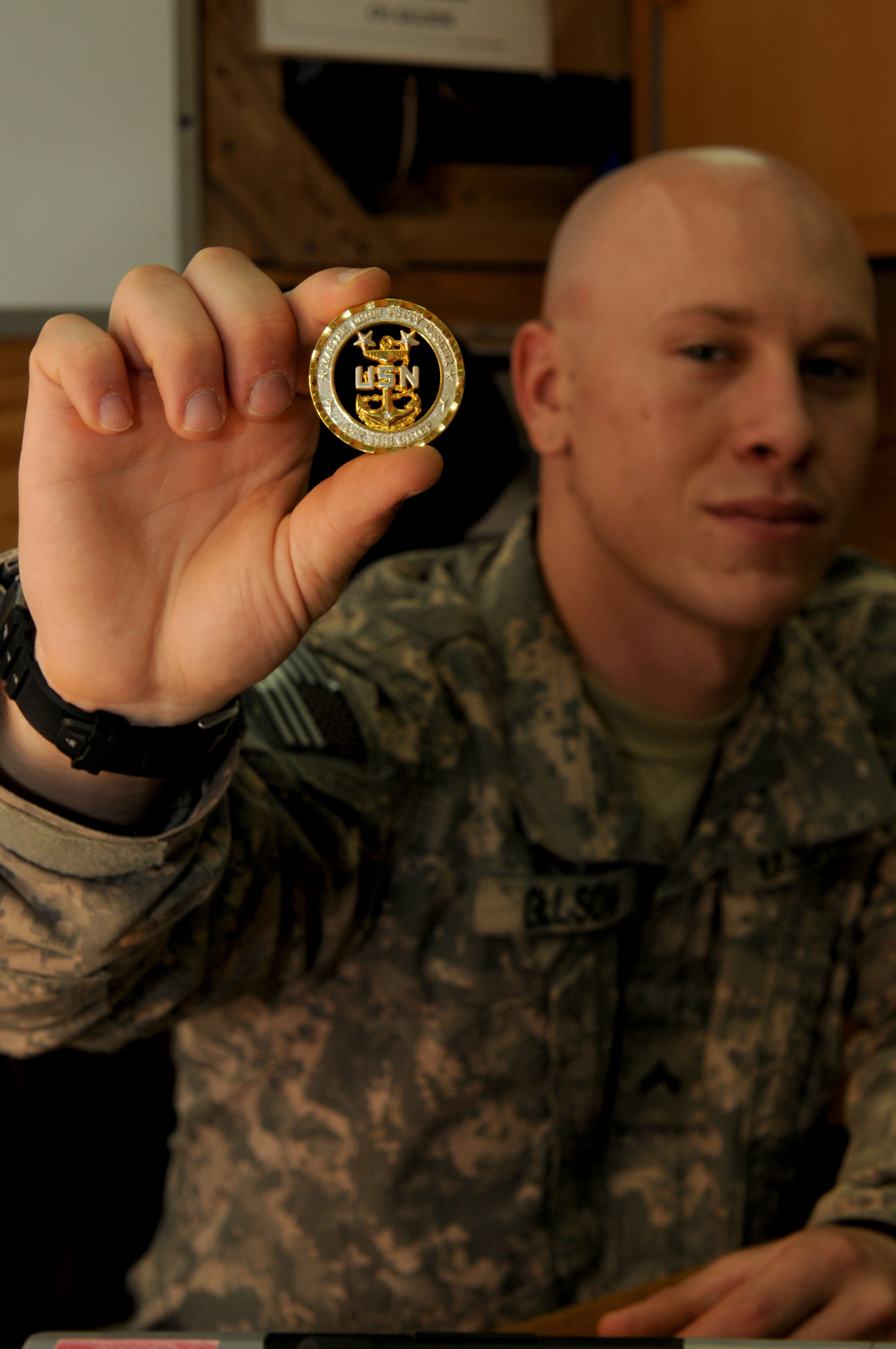CONTINGENCY OPERATING BASE SPEICHER, Iraq - Aristotle once said, "We are what we repeatedly do. Excellence, then, is not an act, but a habit."
Excelling at a job or task is something that Soldiers continually strive to achieve in the military. Many try their hardest to go the extra mile or give it their all when given a task. Hard work is expected out of Soldiers, and efficiency and productivity are noticed.
Leaders and peers notice the extra effort of Soldiers. There are ways of distinguishing and honoring them from certificates of appreciation to a verbal "thank you." One way leaders show gratitude and appreciation, is a unique way that will not expire or easily be replaced.
That unique way often comes in different shapes, sizes, colors and is often personalized. That way of showing appreciation is through a medallion, a coin that is earned through hard work and dedication to the job or mission at hand.
"To me, a coin is like an Army Achievement Medal or award," said Command Sgt. Maj. Byron Loyd, the command sergeant major for Division Special Troops Battalion, 3rd Infantry Division. "There are two types of coins I give: the regular battalion coin that represents the battalion, and then my personal coin that has my name and rank on it. It symbolizes something solid from me as a senior leader. It's my way of saying thank you for the hard work I see you do.
"When I was a young Soldier, my first coin was given to me as a private by then Maj. Gen. Colin Powell. I said to myself, 'Wow. This is a trinket to have.' That is when I found out more about the coin challenge and the background behind military coins."
Generally, those in command positions have personalized coins. However, one doesn't always have to be senior ranking to show his or her appreciation through a coin. For example, a Soldier can buy a coin from the Post Exchange and award their fellow Soldiers with it for doing good deeds. Many would agree though, that the more unique the coin, the more value it means to them.
For Cpl. Eric Gillson, a chaplain assistant, currently assigned under 3rd ID, receiving coins from distinguished individuals makes his job worthwhile.
One coin, a circular medallion, its edges encrusted with a gold plate and the center filled with white paint and a Navy master chief's rank, is one of his favorites. It is special because it came from someone that is not in his direct chain of command, but sees him often. Corporal Gillson was charged with maintaining the Chaplain's Corner, a small office where servicemembers would go to get their morning coffee, socialize and read the daily quotes and riddles on the board. The master chief would come in daily and Cpl. Gillson's hard work paid off.
"He said to me, 'I like your style, and I see the hard work you're doing here,' and it meant a lot to me," said Cpl. Gillson, a St. Paul, Minn. native. "I felt good, because I felt like I received a coin for just being me, just being who I am on a day-to-day basis."
Another one of Cpl. Gillson's favorite coins is one that he earned when he was a private first class.
"I had arrived early to a spiritual retreat, and they needed help setting things up, so I helped them out, and continued to for the rest of the four days I was there," he said. "At the end of it, I was coined by Maj. Gen. Douglas Carver, who is the U.S. Army Chief of Chaplains. Getting your first coin from a major general as a private first class was really cool."
Although there are many different legends contributing to the origin of military inspired coins, one of the most well-known is that of a World War II pilot.
On one particular night during the World War II era, a pilot was handed a token of appreciation - a solid, bronze medallion encrypted with his squadron's insignia.
According to Command Sgt. Maj. Loyd, the medallion was given to him by a fellow pilot in his squadron. The pilot had never owned anything as valuable as this coin, so he placed it in a leather pouch and hung it around his neck for protection.
Shortly thereafter, the pilot's aircraft was damaged by the enemy during a mission, requiring him to land behind enemy lines. German soldiers captured the pilot, confiscating his personal belongings from his pockets. However, they missed one item, his leather pouch that contained the treasured coin.
En route to a prisoner of war camp, the Germans and the pilot made an overnight stop in a German-held French village. British troops then bombarded the area, which drew confusion and chaos and allowed for the pilot to escape.
Eventually, he was caught by French soldiers who mistook the American pilot as a German citizen. Because he was stripped of all identification, the pilot was desperate and seeking for some way to prove he was American to his French allies. Once he presented his coin to the Frenchmen, they recognized the Allied American and brought him back to his squadron.
Today, a coin can represent a token of appreciation, or be used as a challenge to a fellow Soldier.
If Soldiers are out together and one has a coin, he can challenge the others to present a coin on the spot, said Command Sgt. Maj. Loyd. For those who fail to produce a coin, they are required to buy drinks for the table.
For some Soldiers, a coin means more than a pat on the back or a certificate of appreciation; receiving a coin from a distinguished leader brings a boost of morale for the Soldiers. Hopefully, Soldiers who see their peers doing the right thing and getting rewarded for it will be encourage to excel in their work, duties and personal goals.
Coins seem like great compliments. However, some Soldiers feel that they lose their appeal after receiving so many during their military career.
"Soldiers who downplay the coin just shouldn't," said Command Sgt. Maj. Loyd. "It's a sense of pride; it's an on-the-spot impact award. As a command sergeant major who has been in for 25 years, I still value all of my coins, and I love to receive coins and give them to Soldiers for the good things that they do. It's something a Soldier can remember me by."




Social Sharing